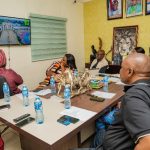The Director General of the Youth in Parliament Forum (YIPF), Tony Nwulu, has announced that 2,000 Nigerian youths will receive free training in electric vehicle (EV) maintenance and manufacturing through a new partnership with CAWIN Mobility Limited.
The programme, launched in Abuja, aims to equip young people with the technical skills needed as Nigeria moves toward renewable energy and green transportation. Nwulu described it as a “historic milestone” that will prepare Nigerian youths to take a leading role in sustainable mobility.
“One major challenge in the coming years will be who will service electric vehicles when they develop faults. This partnership will train 2,000 youths to fill that gap,” Nwulu said during the signing of a Memorandum of Understanding between YIPF and CAWIN Mobility.
The training, starting on September 20, is open to all Nigerian youths. Participants can register on the YIPF website. The programme is completely free, with no fees required.
The training will target 1,000 engineering students and 1,000 mechanics from across the country. Nwulu emphasized the need to build local expertise to support Nigeria’s growing EV market.
“Electric vehicles will require servicing just like any other car. We want to ensure Nigeria has the skilled workforce to maintain them,” he said.
The partnership also introduced the Lawmakers Car Acquisition Scheme (LCAS), which allows federal lawmakers to access electric and conventional vehicles at affordable prices with flexible payment plans and after-sales support.
Hon. Olamijuwonlo Alao-Akala, Chairman of the House Committee on Youth in Parliament, said the training would prepare youths for the global shift to sustainable transportation. He stressed that the programme ensures Nigeria will have a prepared workforce and infrastructure for EVs.
Wayne Ji, Managing Director of CAWIN Mobility, said the initiative would position young Nigerians at the center of the country’s green mobility transition. He highlighted that 1,000 technicians will serve in service centers immediately, while 1,000 engineers will receive advanced training in universities, focusing on EV research, design, and manufacturing.
Ji added that the programme is part of a broader plan to create jobs, diversify the economy, and make Nigeria a leader in West Africa’s electric vehicle revolution.
“To Nigerian youths: take this opportunity seriously. You are not just beneficiaries, you are the future owners of this industry,” Ji said.


















